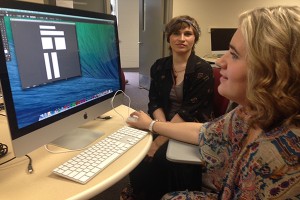With the start of the new semester in full swing, new and returning students to the communications and performance studies (CAPS) department are the first to experience a classroom upgrade to the Thomas Fine Arts building. Aptly named the Mac lab, the room features wall-to-wall desks topped with new Apple iMac’s and an LCD Smart Board in lieu of chalk.

The lab was put together during the summer by a team of technicians from NMU Micro Repair. The process involved routing wires, unboxing and setting up 19 Apple computers, installing reams of software and making sure everything operated properly. Senior biology major Casey Torreano, who is also an Apple certified technician, was a part of the team.
“It took about two days to set up the equipment, install the software and work out all the kinks,” Torreano said. “It’s very powerful, a great setup.”
The facility is an improvement on the resources formerly made available to students, especially those in the media production and new technology major who rely heavily on software for editing audio and video content.
Mike Lakenen, a veteran videographer from NMU’s TV-13 Public Broadcasting station, has been teaching video production at NMU for the past three years.
“In the past we would have 18 students sharing four computers at a time,” Lakenen said. “With the new lab, each student gets their own computer, so their time to interact with the software has gone from 10 minutes during class to over an hour.”
This is not the first time the department has tried to improve the situation. In previous years, students had to install the Adobe production software onto their school issued laptops.
According to Lakenen, the ThinkPad’s were simply not powerful enough to handle the load and frequently crashed, causing major distractions during lecture time.
“I used to spend a lot of time in class fixing problems with the software,” Lakenen said. “We’re a lot more efficient now.”
The new iMacs appear to be more optimized for production work, containing faster processors and larger, sharper displays. They also come loaded with a cache of industry standard production software such as FinalCut Pro, Adobe Audition and Avid ProTools.
“We’re giving students the skills to go out into a real production environment and be able to use any software they come across,” Lakenen said.
To help students share their work, all computers are linked together and can connect to the electronic board at the front of the room. Likewise, if a student needs individualized assistance, an instructor can connect directly to his or her computer and make corrections remotely.
Lakenen sets the pace by devoting the first half of class to learning production theory and spending the rest of the time exploring the software or working on assignments. Also, students are issued an authorization card, so that they can return to the lab after hours to work on projects and implement the ideas they have just learned.
Senior public relations major Alyson Obermiller said she is a big fan of the improvements. Not only does she get to use the new facility in her classes, she spends her free time in there as lab attendant.
“[The new equipment] makes classes so much easier,” Obermiller said. “It’s so seamless. I can take what I’m working on and store it on the server or display it on the screen for everyone to see.”
According to Obermiller, the larger screens have an advantage over the old laptops as well.
“The retina display gives a much sharper, more accurate view of your work and how it will look to other people,” she said.
Being the first to use new technology can come with a few drawbacks. Bugs and other difficulties are commonplace in brand new tech setups, but as of yet they have been few and far between. Obermiller said she has not had to deal with any system problems in her lab experience so far.
Unfortunately, not everyone can use the new facilities. Access is only granted to those in a class which requires use of the lab.
“I wish we could open up the lab to everyone,” Obermiller said. “But I understand the need for security with all the expensive equipment in here.”
A variety of classes in the CAPS department are offered each year, many of which can fulfill elective requirements. Interested students are encouraged to enroll to experience the Mac lab.st hand.





























